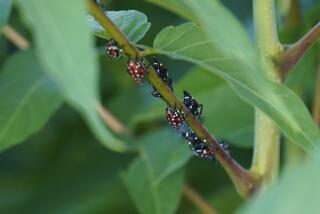COUNTYWIDE : Caterpillars Invade New Housing Tract
- Share via
Thousands of furry black caterpillars are infesting newly completed homes in eastern Ventura from nearby fields, wriggling across roads, up sidewalks and onto the walls and eaves of houses.
Hundreds of the larvae dropped from overhead arches as they lost their grip on stucco.
It’s a sight that makes your skin crawl, said area resident Patricia Klee. Klee and her neighbors in the 20-home Classica tract near the intersection of Kimball and Telegraph roads have been coping with the unexpected siege for the past three days.
“When I came home and saw them this afternoon, it was kind of creepy,” she said.
But insect experts say the infestation is a natural phenomenon that occurs only under the particular set of conditions that exist now. Years of drought followed by the winter’s plentiful rains have produced a bumper crop of a weed called malva--the favorite food of caterpillars--in the vacant lots surrounding the homes, said Jerry Revard, arborist for the city of Ventura.
“It’s like everything is just bursting out and the insects are following,” he said.
The mature larvae are searching for a place to cocoon, Revard said. They will emerge in two or three weeks as the bright orange-and-black Painted Lady butterfly, he said. The smaller caterpillars are seeking out new foliage because the malva in the fields has been denuded by feeding.
East Ventura’s infestation is the only one that has been reported so far, but there are probably similar problems throughout the county, said Phil Phillips, a pest control specialist with the University of California Agriculture Extension office at the County Government Center in Ventura. The caterpillars’ march won’t last longer than a week, Phillips said, because the big ones will form cocoons and the smaller ones will die of starvation.
Revard and Phillips advised the best option is to let Mother Nature take her course.
“At some point in a couple of weeks, we’ll have all those beautiful butterflies. Then we can have something to appreciate,” Phillips said.
More to Read
Sign up for Essential California
The most important California stories and recommendations in your inbox every morning.
You may occasionally receive promotional content from the Los Angeles Times.










